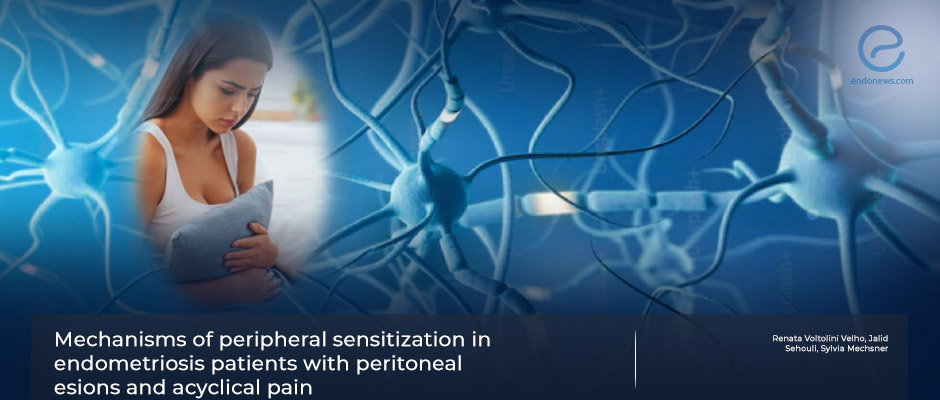Peritoneal Endometriosis and Acyclical pelvic pain
Oct 5, 2023
Peripheral sensitization and increased density of nerve fibers might be causing the extra pain in endometriosis, study indicates
Key Points
Highlight:
- Neurogenic inflammation and peripheral sensitization are responsible for the pain that endometriosis patients suffer from, even when under hormonal therapy.
Importance:
- Chronic pelvic pain in endometriosis is not only caused by inflammation around the endometriotic tissue and therefore not all hormone-dependent.
- The growth of nerve fibers around the peritoneal tissue contributes to the pain that endometriosis patients feel.
What’s done here:
- A study aiming to identify the characteristics of peripheral sensitization around the peritoneal tissue of endometriotic foci was conducted.
- 45 women with endometriosis and 10 controls were included.
- The nerve fiber density of sensory nerve fibers and expression of various nociceptive receptors were assessed by immunohistochemical staining.
Key results:
- Women with endometriosis had significantly more nerve fiber density as shown by PGP9.5 and SP staining.
- Endometriosis patients under hormonal therapy had more nerve fibers.
- NK1R, a nociceptive receptor marker, and neurotrophins NGFp75 and TrKA were found to be higher in endometriosis patients compared to the controls.
- NK1R was significantly reduced in patients receiving hormonal therapy compared to those who were not.
Lay Summary
The most debilitating symptom of endometriosis is chronic pelvic pain. The peripheral nervous system is affected and the growth and regeneration of sensory nerve fibers in endometriotic tissue has been identified. The first line treatment which is hormonal therapy for endometriosis is found to be effective in reducing the cyclical pelvic pain also known as nociceptive pain, however, it may exaggerate the acyclical pelvic pain which is related to neurogenic inflammation and peripheral sensitization.
Voltolini Velho et al. from Berlin, Germany have demonstrated that endometriosis patients under hormonal therapy developed acyclical pain. Intending to understand more about the peripheral sensitization and characteristics of the peritoneal tissue around the endometriotic foci, they conducted a study in which they investigated the properties of nerve fibers by using immunohistochemical staining with nerve markers. The study was published in the October 2023 issue of the journal Archives of Gynecology and Obstetrics.
Peritoneal tissue samples from 45 women with endometriosis and 10 controls were taken and immunohistochemically stained to evaluate the nerve fiber density of sensory fibers and nociceptive receptors. The nerve fiber density as highlighted by PGP9.5 as well as Substance P was significantly increased in women with endometriosis. What is more, those who were taking hormonal therapy had significantly more nerve fibers than those who were not. The authors state that this indicates a relationship between dyspareunia and nerve fiber density.
The neurogenic inflammation as highlighted by NK1R (receptor of Substance P) was also proven to be higher in patients with endometriosis by being detected in blood vessels and immune cells and increased levels of neurotrophins (Nerve Growth Factor Receptor and Tropomyosin Receptor Kinase A) were also observed. It is explained that these help nerve fibers to grow more in the endometriotic tissue and have roles in the generation of related pain. Interestingly, NK1R staining was reduced in patients who were receiving hormonal therapy and the authors hypothesized that hormonal therapy is only reducing the inflammatory pain caused by endometriosis.
The authors conclude by saying that hormonal therapy seems to be only helping the cyclical pain whereas acyclical pain is caused by peripheral sensitization and neurogenic inflammation is still there as shown by the staining with the markers in the study.
Research Source: https://pubmed.ncbi.nlm.nih.gov/37405438/
endometriosis acyclical pelvic pain peripheral sensitization neurogenic inflammation

